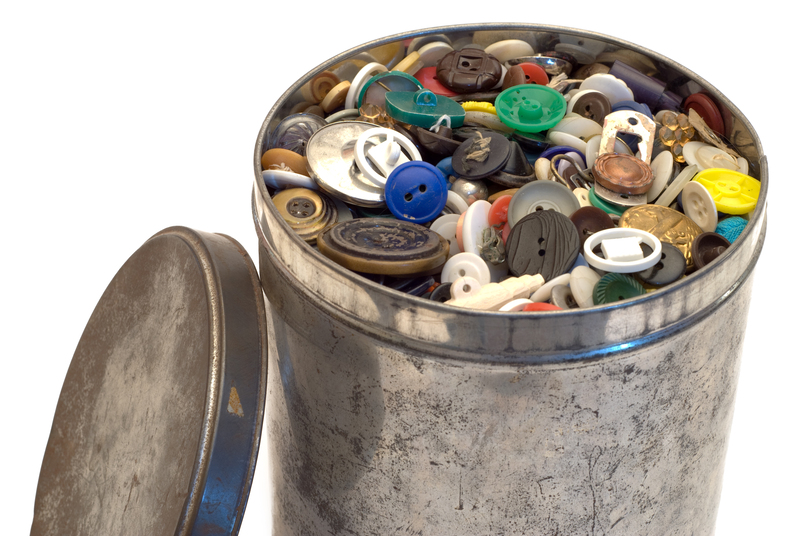Choosing the Best Disposal Methods for Metal Kitchenware
Metal kitchenware is an essential part of any modern kitchen. From stainless steel pots and pans to aluminum trays, copper cookware, and iron utensils, these durable items often last for years. However, no matter how sturdy your metal kitchenware may be, a time comes when you need to get rid of old, broken, or unwanted items. This guide explores the best ways to dispose of metal kitchenware responsibly, sustainably, and even profitably, providing all the information you need to make an eco-friendly choice.
Why Proper Disposal of Metal Kitchenware Matters
Disposing of metal cookware and utensils improperly can have negative environmental consequences. Metals don't degrade quickly; if sent to a landfill, they can take centuries to break down, potentially leaching harmful substances into the soil and water. In addition, many metal items are recyclable, meaning improper disposal wastes valuable resources.
- Environmental Impact: Prevents pollution and conserves natural resources.
- Economic Benefits: Recycled metals can be used in new products, saving energy compared to producing virgin metals.
- Legal Compliance: Some regions have regulations regarding scrap metal and kitchenware disposal.

Assessing Your Metal Kitchenware for Disposal
Before deciding the most appropriate method of disposal, carefully assess your metal kitchenware:
- Condition: Is it broken, rusty, or no longer functional? Or is it still usable?
- Material: Identify if it's stainless steel, aluminum, copper, cast iron, or a combination.
- Attachments or Coatings: Does it have non-metal parts or non-stick coatings?
This assessment helps determine whether you should recycle, donate, repurpose, or opt for a different disposal method.
Popular Disposal Methods for Metal Kitchenware
1. Recycling Metal Kitchenware
Recycling is often the best and most environmentally friendly method for getting rid of unwanted or damaged metal pots, pans, and utensils. Most municipal recycling programs accept metal kitchen items, particularly if they are 100% metal (without plastic or rubber handles). Recycling differs slightly based on the type of metal and your local facilities.
- Stainless Steel: Commonly accepted; remove any non-metal parts.
- Aluminum: Easy to recycle; make sure items are clean.
- Cast Iron: Very durable; often accepted by scrap yards.
- Copper: Highly valuable and always recyclable.
How To Recycle Metal Kitchen Items:
- Clean pans and utensils thoroughly.
- Remove plastic or wooden handles if possible.
- Check with your city's recycling program for rules and drop-off locations.
- For larger quantities or unusual metals, contact a local scrap metal dealer.
2. Donating Usable Metal Kitchenware
If your items are gently used and still functional, consider donating your kitchenware. Many charities, shelters, thrift shops, and community organizations welcome these items. Not only does this method avoid waste, but it also helps others in need.
- Call your local thrift store to confirm they accept kitchenware.
- Clean and sanitize items before donation.
- Avoid donating heavily damaged, rusty, or hazardous items.
_"Donating is an eco-conscious and generous way to extend the life of your cookware and utensils."_
3. Repurposing and Upcycling Old Metal Kitchenware
Get creative by repurposing metal kitchen items for other uses at home or in the garden. Upcycling is a fun way to keep metal objects out of the landfill and add unique charm to your spaces.
- Pots and Pans: Turn old pots into planters or decorative garden features.
- Utensils: Bend forks and spoons into hooks, wind chimes, or art projects.
- Bakeware: Use muffin tins as drawer organizers or paint trays.
_Don't underestimate the potential of your unwanted kitchenware to become a conversation piece!_
4. Selling Scrap Metal Kitchenware
If your kitchenware is made of high-value metals (such as copper or aluminum), you may be able to turn old items into cash by selling them to a scrap yard. This method also supports the recycling industry and ensures metals are reused efficiently.
- Contact local scrap metal dealers for current prices.
- Sort and separate metals for better offers.
- Ensure items are free of non-metal attachments.
5. Bulk Pickups and Recycling Events
For large volumes of kitchen metalware disposal, such as during restaurant renovations or home cleanouts, consider municipal bulk collection days or special recycling events. Some local governments offer scheduled pickups for metal items or host annual recycling fairs.
- Check your city's website for bulk waste schedules.
- Follow guidelines for preparing items for collection.
Special Considerations for Certain Types of Metal Kitchenware
- Non-Stick Cookware: Most traditional non-stick coatings are not recyclable due to their chemical makeup. Remove or strip coatings if possible, or recycle at specialized facilities.
- Mixed Materials: Handles made of plastic, wood, or rubber may need to be removed before recycling.
- Appliance Parts: Many kitchen appliances contain metal components that should be recycled separately.
Note: Never dispose of metal cookware in general household trash unless absolutely necessary. Landfilling is the least eco-friendly disposal method and should be avoided.
Common Questions About Metal Kitchenware Disposal
Can I Throw Metal Pans in the Recycling Bin?
It depends on local regulations. Many recycling programs accept all-metal pans, but those with non-metal handles, non-stick coatings, or other attachments may be rejected. Always consult your municipality's guidelines, and where possible, remove all non-metal parts first.
How Do I Recycle Rusty or Damaged Pots and Pans?
Most recycling centers and scrap yards accept rusty metal. However, cleanliness is essential--ensure no food residue remains. For heavily corroded items, confirm acceptance with the site beforehand.
Are Metal Utensils Recyclable?
Yes, most metal utensils can be recycled along with other scrap metal. Mixes of certain materials may require separation. If you're unsure, call your local recycler.
Can I Give Away Old Metal Kitchenware for Free?
Absolutely! List items for free on community platforms like Freecycle, Craigslist, Facebook Marketplace, or local "buy nothing" groups.

Eco-Friendly Practices for Reducing Kitchenware Waste
While responsible disposal is important, the best environmental strategy is to reduce and reuse from the start. Here are some tips:
- Buy Quality: Invest in high-quality, durable metal cookware that lasts longer.
- Maintain Products: Proper care (such as seasoning cast iron or descaling stainless steel) can extend the life of metal kitchen items.
- Repair When Possible: Consider refurbishing or fixing handles and minor damage rather than discarding.
- Share or Trade: Swap gently used kitchenware with friends or neighbors.
Develop a Metal Kitchenware Disposal Plan
Having a comprehensive plan for disposal of metal cookware will ensure you always make sustainable choices. Here's a simple framework:
- Inventory: Identify items for disposal and assess their condition.
- Research Options: Check local recycling and donation programs.
- Prepare Items: Clean, separate, and sort metalware as needed.
- Choose the Best Method: Recycle, donate, repurpose, or sell--depending on item condition and type.
- Document Disposal: Keep receipts for donated or scrapped items for potential tax deductions or records.
The Future of Sustainable Metal Kitchenware Disposal
As environmental awareness grows, more communities and manufacturers are taking steps to improve the recyclability of kitchen products. Some companies now offer take-back programs for their cookware lines, making it easier for consumers to dispose of items responsibly. By choosing the best methods for kitchenware disposal, you not only protect the planet but also encourage innovation in product design and waste management.
Summary: Choosing the Best Disposal Methods for Metal Kitchenware
- Recycling is the most sustainable option for most items.
- Donation is perfect for usable, undamaged kitchenware.
- Repurposing offers creative solutions for non-recyclable or sentimental items.
- Selling scrap metal can generate extra income while protecting resources.
- Avoid landfill disposal whenever possible to minimize environmental impact.
Ultimately, the best disposal methods for metal kitchenware balance environmental responsibility, local guidelines, and the condition of the items. With a little effort, you can ensure your old pots, pans, and utensils benefit someone else--or at least help keep the cycle of metal reuse going strong.
Ready to dispose of your metal kitchenware? Start today by checking your local recycling programs and exploring creative ways to give old items new life. Choose the smart, sustainable, and eco-friendly path for every piece of metal in your kitchen!
```